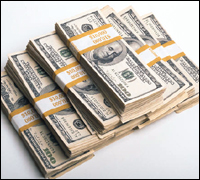The Trouble With Cash--a World Awash in $100 Federal Reserve Notes
In my previous article I showed that currency in the economy is exactly analogous to poker chips in the hands of players at a casino. This article discusses the advantages and disadvantages of cash (currency and coin). This feature of monetary systems is ubiquitous. There are no monetary systems that do not have a currency component.
Who needs cash?
Everyone needs some readily spendable money for small purchases of daily needs. Cash is never refused in such transactions, and it is the most convenient way to buy our small casual needs. But there are other uses for cash, and most of them involve transactions that are intended to be confidential and anonymous. The more costly the transaction involving cash, the more likely it is that secrecy is desired. This is the trouble with cash.
When a paper trail (beyond a receipt) is required, cash is not used. This means that it is not feasible to design a monetary system without banks and checking accounts. Further, since cash is readily spendable in anonymous transactions it is highly prized by thieves and risky to hold in large quantities. In any imaginable society, therefore, there are going to be banks and checking accounts.
That said, let's look at vulnerabilities of our monetary system caused by the need for cash.
Counterfeit
First, let's briefly consider counterfeit currency. If it is possible to make passable counterfeit bills there will be counterfeiters. The effect of an influx of counterfeit into circulation is to create inflation. The more counterfeit there is in circulation, the less the dollar is worth. There has been, in recent years, a growing effort to redesign the higher denomination Federal Reserve Notes to make counterfeiting much more difficult. In 2006 the Federal Reserve estimated that 1 in 10,000 Notes was counterfeit.
Distribution of Federal Reserve Notes
Until fairly recently the only way US currency could get into circulation in foreign lands was for traveling US citizens to make purchases there from a willing vendor using US currency. The deregulation of the US banking system and globalization have ended that situation and have brought changes to the monetary system that have a huge impact on the stability of the US economy without any public discussion whatever.
The reason these changes have come about has nothing to do with providing the American people a better, more useful medium of exchange or store of value. In fact, the changes have made our banking system dependent on foreign actors that we do not control at the expense of our national economic stability.
The rest of the developed world is now awash in $100 Federal Reserve Notes. The Federal Reserve has published a defense of this fact that makes the claim that this huge amount of US cash held by foreigners in other countries is a financial benefit to the US. The logic of that as explained in "The Location of U.S. Currency- How Much Is Abroad?" FRB Bulletin Oct 1996, invokes the idea that the US is benefitting from it in the same way as if it were an interest-free loan to the US Treasury--an idea that seems wrong to me. But if true it is a loan of an amount determined by foreign actions, not deliberate actions of the Fed. Such "loans" also can be terminated by foreign holders of the cash without the consent of the Fed, and with potential damage to the US economy. Congress has never authorized this kind of borrowing, and it has many downsides as discussed here.
A brief publication of the San Francisco Federal Reserve Bank, April 2004, titled "How much currency is circulating in the economy, and how much of it is counterfeit? Is currency included in the money supply statistics?" provides some insight. In March, 2004, the Federal Reserve estimated that US currency in circulation worldwide was about $667 billion. About 60% of it, or $370 billion, was estimated to be held overseas. By 2013 the total amount of currency in circulation had grown to $1.2 trillion dollars, and 70.7% was estimated to be held abroad. To put that in perspective, that is $2,660 dollars for every man, woman, and child in the United States. Quoting from "How Currency Gets into Circulation", July 2013, Federal Reserve Bank of NY,
"As of July 2013, currency in circulation--that is, U.S. coins and paper currency in the hands of the public--totaled about $1.2 trillion dollars. The amount of cash in circulation has risen rapidly in recent decades and much of the increase has been caused by demand from abroad. The Federal Reserve estimates that the majority of the cash in circulation today is outside the United States."
Note that these numbers are only estimates. The Federal Reserve admits that it is not possible to account for all this cash exactly, because cash is easily concealed and cannot be tracked as it moves from one possessor to another.
(Note: You can view every article as one long page if you sign up as an Advocate Member, or higher).






